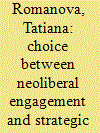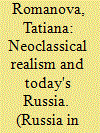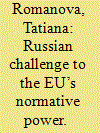|
|
|
Sort Order |
|
|
|
Items / Page
|
|
|
|
|
|
|
| Srl | Item |
| 1 |
ID:
188564


|
|
|
|
|
| Summary/Abstract |
This article explores the dynamic coexistence of neoliberal and realist narratives in the EU's discourse on international green cooperation with a focus on Russia. Using critical discourse analysis and critical geopolitics, the article explores how the neoliberal and realist narratives were applied in the EU's international (Russia-focused) energy transition cooperation. The neoliberal narrative presupposed fine-tuned multilateralism and market openness, with an opportunity for Russia to join the EU's success story. The realist narrative was based on the notions of relative gains, strategic autonomy/sovereignty, market corrections by public authorities, borders and closed alliances, Russia was used in this narrative to encourage more EU autonomy and strategic partnerships. The article demonstrates how and why the geopolitical narrative was strengthened between 2020 and 2021. It reveals the similarities between the neoliberal and realist narratives regarding the policy framework and relative positions of the EU and Russia in the spacialisation of the green energy policy. As a result, no policy opening for selective engagement with Russia emerged; rather, the 2020–2021 discourse prepared the EU for a policy shift that it took to react to Russia's assault against Ukraine in February 2022.
|
|
|
|
|
|
|
|
|
|
|
|
|
|
|
|
| 2 |
ID:
150536


|
|
|
|
|
| Summary/Abstract |
Russian external energy policy is frequently described as geopolitical (as opposed to EU energy policy, which is often characterised as market-based). This article reviews geopolitical and market approaches in existing studies and identifies paradigmatic and instrumental levels in each of them. It then proceeds to demonstrate that although the geopolitical paradigm dominates in Russia, Russia has also reacted to the EU’s third liberalisation package, using legal and technocratic instruments, which are parts of the market approach. Each set of instruments has its institutional basis in Russia: the President, the Ministry of Foreign Affairs (MFA) and Gazprom work in geopolitical ways but with frequent recourse to legal instruments, the Ministry of Economic Development (MED) promotes legal instruments and the Ministry of Energy (ME) is the centre of the technocratic activities, which Gazprom also frequently applies at present. This study therefore provides a more complex picture of Russian external energy policy. Moreover, it reveals a potential opening for a degree of policy convergence between the EU and Russia. In this context it is regrettable that legal and technocratic instruments were compromised as a result of the 2014 worsening in EU-Russian relations.
|
|
|
|
|
|
|
|
|
|
|
|
|
|
|
|
| 3 |
ID:
124340


|
|
|
|
|
| Publication |
2012.
|
| Summary/Abstract |
This article is to outline a theoretical context for a relatively new discussion. Initially, I will formulate the main provisions of neoclassical realism, then I will briefly review the neoclassical view of Russian foreign policy that we presented three years ago. Finally, I will look at how the ongoing transformations - some of which are clearly visible while others are hardly noticeable - may influence the conception and practical realization of Russian foreign policy.
|
|
|
|
|
|
|
|
|
|
|
|
|
|
|
|
| 4 |
ID:
158387


|
|
|
|
|
| Summary/Abstract |
A conventional opinion is that Russia is trying to destroy the liberal international order. Russia indeed defies it, but also justifies its foreign policy with the liberal order’s normative frameworks and reproaches the West for not standing up to these norms. Moreover, Moscow does not present any alternative vision. Russia complains about the internal contradictions of the liberal order: sovereignty vs. intervention, pluralism vs. universality, US hegemony vs. equality and democracy, although it also exploits these contradictions. In fact Russia demands an adjustment of the liberal order rather than its eradication and should, therefore, be classified as a neorevisionist power. Two elements underlie Russia’s at times aggressive foreign policy conduct. The first one, its feeling of being ill-accommodated in the present order, predefines the direction of the policy. The second, the prioritisation of foreign policy over domestic reforms, explains the intensity of Russian discontent and its occasional aggressive manifestations. Russia’s domestic consensus regarding its foreign policy, including views on the liberal international order, facilitates this aggressiveness. Three policy conclusions can be drawn: acknowledging that Russia uses the inherent contradictions of the liberal international order opens up possibilities for dialogue and an eventual overcoming of the crisis; the survival and strengthening of the liberal order depends on its embrace of all major players, including Russia, and hence, the need for some adjustments to the order itself; and finally such adjustments presuppose Russia’s readiness to shoulder responsibility for the (reformed) liberal international order.
|
|
|
|
|
|
|
|
|
|
|
|
|
|
|
|
| 5 |
ID:
145302


|
|
|
|
|
| Summary/Abstract |
The article examines how Russian criticism of the normative power Europe (NPE) has evolved. Initially Russia insisted that NPE arguments covered realpolitik. However, two new approaches have recently emerged in Russian reporting on human rights in the EU. One is the demonstration that the EU does not qualify as a normative power. Another is the development of an alternative interpretation of human rights. Russia has, therefore, mastered all NPE critiques. This has occurred as the result of a change in how Russia views international relations. Moscow’s ultimate goal has, however, remained unchanged; it is to reaffirm its equality with key global players.
|
|
|
|
|
|
|
|
|
|
|
|
|
|
|
|
| 6 |
ID:
180099


|
|
|
|
|
| Summary/Abstract |
Four interpretations of the EU's energy transition can be identified in Russia's political discourse in 2014–2019 based on the matrix that combines realist and liberal approaches to energy relations and the denial or recognition of climate change. The cross-cutting idea of these interpretations is that Russia follows the market logics, whereas the EU either politicises energy relations or chooses economically unreasonable options. Most Russian actors advance all four interpretations in parallel. A liberal interpretation, which recognises climate change, became dominant towards the end of the examined period. Two main policy options are shaped by Russia's political discourse on the EU's energy transition: maintaining the status quo in EU-Russian gas trade and diversifying Russia's export markets. Russia's political discourse reveals a strong ideational difference with the EU on future energy policies, and Russia poorly engages with the EU's post-2030 planning. It is recommended that the EU improve its energy transition communication with Russia, and Russia is advised to enlarge the range of its policy options by better engaging with the EU's long-term energy planning. Russia and the EU also must examine energy transition in the broader context of their relations. Practical project-based cooperation can contribute to ideational convergence between the EU and Russia on future energy policies.
|
|
|
|
|
|
|
|
|
|
|
|
|
|
|
|
| 7 |
ID:
146334


|
|
|
|
|
| Summary/Abstract |
The essay examines the qualitative changes in EU–Russian relations which resulted from the 2014 sanctions. Thematic, structural and institutional aspects of the issue are analysed through the ‘level of analysis’ approach. Thematically, policy-specific and implementation measures reinforced an EU–Russian ‘divorce’ both in energy and trade. Structurally, the scope of EU–Russian dialogue narrowed in favour of relations between Moscow and member states, and in multilateral fora; this dialogue also became dependent on Russia–US relations. Institutionally sanctions have led to the growing poverty of transgovernmental and transnational relations. As a result, achievements of previous years have been derailed, and reversal of the negative trends will prove difficult.
|
|
|
|
|
|
|
|
|
|
|
|
|
|
|
|
| 8 |
ID:
147733


|
|
|
|
|
| Summary/Abstract |
Two leadership models have historically evolved in the EU. The European Commission (EC) provides the first model. It was the most influential institution at the start of European integration (1950s), as well as during the presidency of Jacques Delors (1980s), when a common internal market emerged and the transition towards a single currency began. Its main asset was technocracy as well as the reputation and charisma of the EC president. The second leadership model is embodied in the Franco-German tandem, where Paris exercised political leadership while Germany guaranteed sustained economic growth. In this context, the consensus between Paris and Berlin responded to the demands of all other EU members. The main asset of this model was its capability to accommodate different interests, combined with crisis management experience.
|
|
|
|
|
|
|
|
|
|
|
|
|
|
|
|
| 9 |
ID:
101714


|
|
|
|
|
| Publication |
2010.
|
| Summary/Abstract |
Political ecology is an extremely interesting and promising area of research - both theoretical and applied. However, further probes are required, that would make it possible to move on from the accumulation of empirical data to the required level of theorizing, and also to devise a comprehensive strategy for the state to follow in practice. Delays in this field would keep Russia in a second-rate position in the world for decades to come.
|
|
|
|
|
|
|
|
|
|
|
|
|
|
|
|
|
|
|
|
|